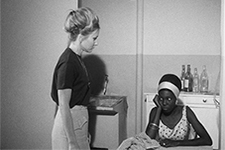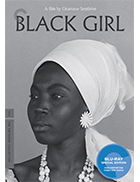Black Girl (Le noire de …) [Blu-Ray]
|

Ousman Sembène's first feature film, Black Girl (Le noire de …) was one of the very first feature films to emerge from Africa. Sembène, a novelist who turned to filmmaking because he thought it was a better medium to reach an African audience that was largely illiterate, had previously made a short film titled Borom Sarret (1963), which is generally considered the first true African film. While there had been numerous film made in north Africa since the 1920s, those are generally associated with Arab cinema; Sembène's film, which was set in his native Senegal, was the first to emerge from sub-Saharan African, which at the time had no filmic resources, infrastructure, technologies, or sources of financing. Sembène was in the position of literally forging African cinema as he went, which is what makes Black Girl such an important, groundbreaking achievement. The film was based on Sembène's novella of the same name that was originally published in the 1962 collection Voltaïque (Tribal Scars). Sembène's original impetus for writing the novella came from a French newspaper article he read about an African maid who committed suicide in the bathtub of the wealthy French family that had hired her. It was a short article with virtually no information, and it set Sembène wondering who the girl was, where she came from, how she came to work in France, and what drove her to the ultimate act of self-annihilation? Black Girl was his literary response, a way to deal in fiction with difficult questions about identity, colonialism, and the conflict between the two. Mbissine Thérèse Diop stars as Diouana, the black girl of the title, who leaves Dakar, the city where she was born and has lived all her life, for Antibes on the French Riviera, where she is to work as domestic help for a husband and wife, known only as Monsieur (Robert Fontaine) and Madame (Anne-Marie Jelinek). She had previously worked for them when they were living in Dakar taking care of their three children, which she enjoyed, and when they bring her to Antibes, she assumes it is for the same purpose. But, when she arrives, she finds that they children are not there and she is expected to cook and clean for the family while also standing as a kind of status symbol, the "exotic" black help who cooks authentic Senegalese cuisine for their friends and quietly endures their racist banter and treatment. In coming to France, she imagined that she would have the opportunity to explore the country and live a fascinating European life, but she soon finds that she is confined almost entirely to the family's small apartment, her only excursions outside being to the market. She is treated with casual disdain and condescension by the family, although Madame sometimes unleashes aggressive verbal assaults, particularly in a scene where she berates Diouana for wearing the same clothes every day. She is never beaten or otherwise physically hurt, but the accumulation of interpersonal violence becomes overwhelming, crushing any sense of identity she had and rendering her little more than a slave, unable to be anything other than what the family determines her to be. Diouana's loss of self becomes the film's great tragedy, although Sembène keeps the narrative just vague enough to prevent us from making easy connections and drawing comfortable conclusions. As abusive as the family is toward Diouana, she bears some responsibility for her own situation, as her lack of agency and quiet acceptance of her fate leads her into a spiral of depression that makes it difficult for her to even get out of bed, which only further enrages Madame, who simply assumes she is being lazy. In flashbacks we see that Diouana was warned of this possibility by her boyfriend, who is politically engaged and more aware of the insidious nature of colonialism and how it undermines individuality by creating a constant victim mentality. We hear Diouana's thoughts in voice-over narration, and they suggest a sense of introspection that, had it been nurtured, could have led to some kind of liberation. We see that she is someone of spirit back in Dakar, celebrating happily with her mother when she gets the job working for the French family and gamely dancing across a war monument in a way that infuriates her boyfriend. By scattering these flashbacks throughout the film, Sembène constantly reminds us of what is being lost and suggests powerfully how colonialism and its mindset does not immediately dissipate once a country has achieved independence.
Copyright © 2017 James Kendrick Thoughts? E-mail James Kendrick All images copyright © The Criterion Collection | |||||||||||||||||||||||||||||||||||
Overall Rating:



 (3.5)
(3.5)
Subscribe and Follow
Get a daily dose of Africa Leader news through our daily email, its complimentary and keeps you fully up to date with world and business news as well.
News RELEASES
Publish news of your business, community or sports group, personnel appointments, major event and more by submitting a news release to Africa Leader.
More Information
